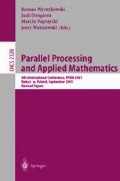Abstract
This paper presents an overview of pARMS, a package for solving sparse linear systems on parallel platforms. Preconditioners constitute the most important ingredient in the solution of linear systems arising from realistic scientific and engineering applications. The most common parallel preconditioners used for sparse linear systems adapt domain decomposition concepts to the more general framework of “distributed sparse linear systems”. The parallel Algebraic Recursive Multilevel Solver (pARMS) is a recently developed package which integrates together variants from both Schwarz procedures and Schur complement-type techniques. This paper discusses a few of the main ideas and design issues of the package. A few details on the implementation of pARMS are provided.
Work supported by NSF/ACI-0000443, NSF/INT-0003274, and by the Minnesota Supercomputer Institute
Access this chapter
Tax calculation will be finalised at checkout
Purchases are for personal use only
Preview
Unable to display preview. Download preview PDF.
References
S. Balay, W. D. Gropp, L. Curfman McInnes, and B. F. Smith. PETSc 2.0 users manual. Technical Report ANL-95/11-Revision 2.0.24, Argonne National Laboratory, 1999.
V. Eijkhout and T. Chan. ParPre a parallel preconditioners package, reference manual for version 2.0.17. Technical Report CAM Report 97-24, UCLA, 1997.
W. Gropp, E. Lusk, and A. Skjellum. Using MPI: Portable Parallel Programming with the Message Passing Interface. MIT press, 1994.
Scott A. Hutchinson, John N. Shadid, and R. S. Tuminaro. Aztec user’s guide. version 1.0. Technical Report SAND95-1559, Sandia National Laboratories, Albuquerque, NM, 1995.
D. Hysom and A. Pothen. A scalable parallel algorithm for incomplete factor preconditioning. Technical Report (preprint), Old-Dominion University, Norfolk, VA, 2000.
M. T. Jones and P. E. Plassmann. BlockSolve95 users manual: Scalable library software for the solution of sparse linear systems. Technical Report ANL-95/48, Argonne National Lab., Argonne, IL., 1995.
Z. Li, Y. Saad, and M. Sosonkina. pARMS: a parallel version of the algebraic recursive multilevel solver. Technical Report umsi-2001-100, Minnesota Supercomputer Institute, University of Minnesota, Minneapolis, MN, 2001.
G. Radicati di Brozolo and Y. Robert. Parallel conjugate gradient-like algorithms for solving sparse non-symmetric systems on a vector multiprocessor. Parallel Computing, 11:223–239, 1989.
Y. Saad. A flexible inner-outer preconditioned GMRES algorithm. SIAM J. on Sci. and Stat. Comput., 14:461–469, 1993.
Y. Saad. Krylov subspace methods in distributed computing environments. In M. Hafez, editor, State of the Art in CFD, pages 741–755, 1995.
Y. Saad. Iterative Methods for Sparse Linear Systems. PWS publishing, New York, 1996.
Y. Saad and A. Malevsky. PSPARSLIB: A portable library of distributed memory sparse iterative solvers. In V. E. Malyshkin et al., editor, Proceedings of Parallel Computing Technologies (PaCT-95), 3-rd international conference, St. Petersburg, Russia, Sept. 1995, 1995.
Y. Saad and M. Sosonkina. Distributed schur complement techniques for general sparse linear systems. J. Scientific Computing, 21(4):1337–1356, 1999.
Y. Saad and B. Suchomel. ARMS: An algebraic recursive multilevel solver for general sparse linear systems. Technical Report umsi-99-107-REVIS, Minnesota Supercomputer Institute, University of Minnesota, Minneapolis, MN, 2001. Revised version of umsi-99-107.
Y. Saad and K. Wu. Parallel sparse matrix library (P_SPARSLIB): The iterative solvers module. Technical Report 94-008, Army High Performance Computing Research Center, Minneapolis, MN, 1994.
Y. Saad and K. Wu. Design of an iterative solution module for a parallel sparse matrix library (P_SPARSLIB). In W. Schonauer, editor, Proceedings of IMACS conference, Georgia, 1994, 1995.
Author information
Authors and Affiliations
Editor information
Editors and Affiliations
Rights and permissions
Copyright information
© 2002 Springer-Verlag Berlin Heidelberg
About this paper
Cite this paper
Saad, Y., Sosonkina, M. (2002). pARMS: A Package for Solving General Sparse Linear Systems on Parallel Computers. In: Wyrzykowski, R., Dongarra, J., Paprzycki, M., Waśniewski, J. (eds) Parallel Processing and Applied Mathematics. PPAM 2001. Lecture Notes in Computer Science, vol 2328. Springer, Berlin, Heidelberg. https://doi.org/10.1007/3-540-48086-2_49
Download citation
DOI: https://doi.org/10.1007/3-540-48086-2_49
Published:
Publisher Name: Springer, Berlin, Heidelberg
Print ISBN: 978-3-540-43792-5
Online ISBN: 978-3-540-48086-0
eBook Packages: Springer Book Archive

